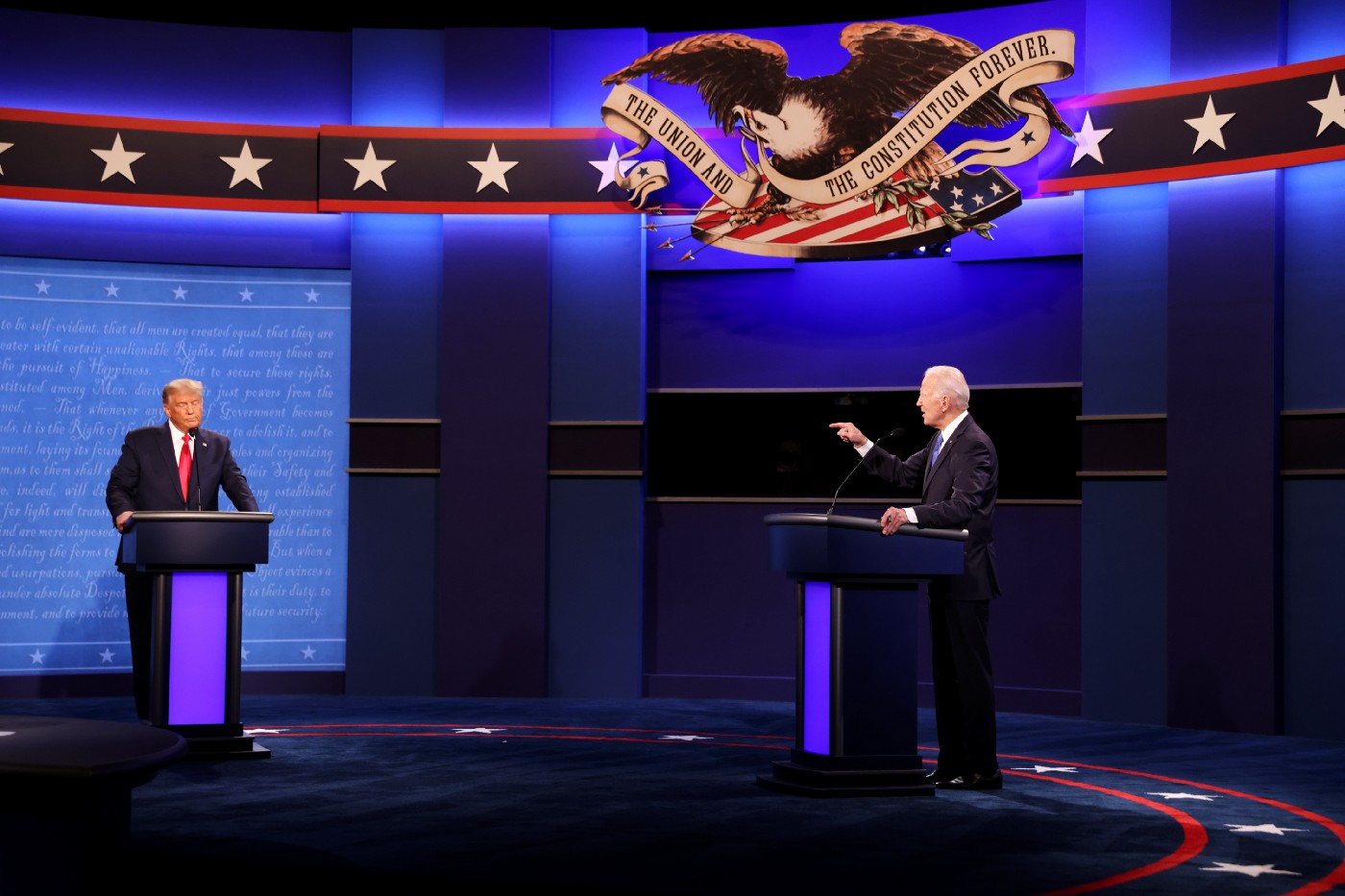
Almost everyone seems to think last night’s debate was so much better than the first. To me, that’s a bit like saying having a stroke is much better than suffering a heart attack. It’s not. Even if it’s less painfully dramatic to watch, the damage is the same — or, in this case, actually worse.
A less unhinged president speaking lies in a calm voice is not fundamentally an improvement over a totally unhinged president shouting lies out of turn. It simply camouflages the inadequacy of his arguments under the veneer of a well-established format. Indeed, the debate structure itself enables and legitimizes the untethering of civic discourse from on-the-ground reality. This can’t go on. Blame the moderators all you want, but the form itself is untenable. Or at least it’s been rendered obsolete by a combination of television values and intentional spoilsporting.
Merely turning on the TV felt a bit like subjecting myself to a late season of Jerry Springer or The Apprentice — when the thrill of getting to see something horrifically vulgar no longer titillates. The nerve endings capable of responding to it are fried to a crisp. The bizarre reality show that has been masquerading as a democratic process for the past four years now feels less like must-see TV than an obligatory vigil.
Trump knew this. His televised town hall last week lost in the Nielsen ratings to Biden’s, even though he was on more channels. And so he had to change his game and play grown-up for the television viewers, even if only for an hour or so, to prove he could do it.
The debate organizers played along, using a mute switch to ensure Trump waited his turn. But it’s not as if a mute button meant his schoolyard antics would be exchanged for reasoned discourse. We didn’t trade Celebrity Deathmatch for PBS Frontline. No, we got a slightly more presidential Trump, but it was still Trump. He hit Biden with fake smear while Biden hit him with real smear.
But because Trump’s performance occurred in what appeared to be a competently moderated debate, the effect was somewhat equalizing. “Let’s put the same question to you… ” Kristen Walker kept saying as if proffering exactly the same question and providing equal time constituted fairness, even though the candidates wielded those two minutes very differently.
Trump used his segments to just say stuff that wasn’t true: We’ll have a vaccine in weeks. Biden took $3.5 million from Putin’s wife. Some debunked conspiracy theory about a Chinese laptop. Blue states are doing worse with Covid-19. Biden used his two-minute segments to explain his health care plan, his energy policy, and his Covid plan.
But you’d never know that difference seeing the two men side by side in the sanitized confines of a screen. And that’s the tragic flaw of television. It’s a self-contained universe, where a person’s ability to “connect” with the viewer is the only thing that matters.
In that sense, the most honest moment of the debate — the truest to the television environment, anyway — was when Trump deconstructed Biden’s style of delivery. Trump had just made a bunch of accusations about Biden’s family taking money from Russia and Ukraine. Biden looked straight in the camera and told us, “You know who I am, you know who he is.” Trump then reframed the media moment, explaining that whenever Biden looks in the camera, he is playing the role of a corrupt politician — as if to defuse Biden’s one TV superpower. It was the snarky meta-theatrics of reality TV trying to take down the earnest, I-feel-you kumbaya of traditional television.
Thursday night only proved, once again, that the values of television performativity have fully swallowed political discourse. The presidential debates are themselves more a product of TV than they are of traditional politics. We didn’t even have presidential debates until the televised 1960 contest between Kennedy and Nixon. It’s not some time-honored tradition. (The famous Lincoln-Douglas debates were over a Senate seat, and each candidate spoke for an hour at a time!)
Given the co-evolution of television and presidential debates, it’s no wonder they would follow this same trajectory toward spectacle and sensationalism. The sad part is how hard news channels in this increasingly sensationalist, ratings-driven environment try to make it look like they’re still doing their job—to present balanced, fact-based programming—when they air these things.
By maintaining this charade, they only give cover to a cynical player like Trump. The president understands the medium and its flaws, and he uses it against those who are watching in order to make sense of the world.
Televised debates were never really much more than a novelty, a platform for candidates to hit each other with fresh zingers. And if it’s gotten to the point where those of us who care about government and our collective future only watch in order to make sure nothing too catastrophic happens, well, it means it’s time to accept they do more harm than good.